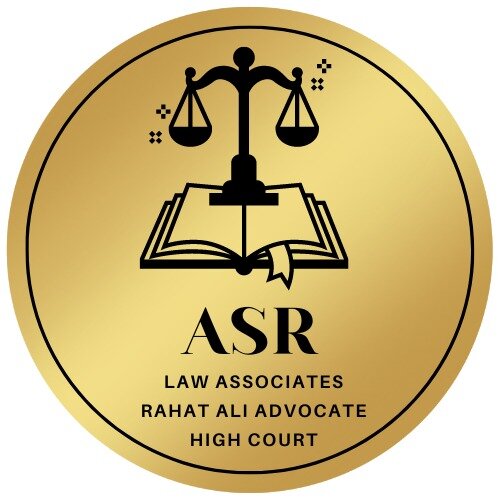Best Mortgage Lawyers in Faisalabad
Share your needs with us, get contacted by law firms.
Free. Takes 2 min.
Free Guide to Hiring a Real Estate Lawyer
List of the best lawyers in Faisalabad, Pakistan
About Mortgage Law in Faisalabad, Pakistan
In Faisalabad, Pakistan, a mortgage is a legal agreement by which a bank or similar entity lends money at interest in exchange for taking title of the debtor's property, with the condition that the conveyance of title becomes void upon the payment of the debt. Over the years, the mortgage system in Faisalabad has evolved to accommodate the economic activities in this industrial hub. The system is regulated by the Transfer of Property Act, 1882, and other relevant local statutes, ensuring that both lenders' and borrowers' rights are protected.
Why You May Need a Lawyer
There are several situations where one might need legal help with mortgages in Faisalabad:
- Contract Negotiation: When drafting or negotiating the terms of a mortgage to ensure fair conditions.
- Dispute Resolution: In cases of disputes regarding payments, foreclosure, or any breach of contract.
- Foreclosure Defense: Protecting your property from being foreclosed due to payment-related issues.
- Refinancing and Restructuring: Legal guidance on restructuring mortgage plans or exploring refinancing options.
- Legal Compliance: Ensuring all procedures comply with the current Pakistani laws and regulations.
Local Laws Overview
The local mortgage laws in Faisalabad are primarily governed by the Transfer of Property Act, 1882, which outlines the rights and responsibilities of both the borrower and the lender. The Registration Act, 1908 mandates that all mortgage agreements must be registered to be enforceable. The relevant sections also cover aspects such as notices required for default, foreclosure proceedings, and the creation of equitable mortgages by deposit of title deeds. Understanding these laws ensures all parties engage in fair practices and have legal recourse in case of disagreements.
Frequently Asked Questions
What is the minimum down payment required for a mortgage in Faisalabad?
Typically, lenders may require a down payment ranging from 15% to 30% of the property's value depending on the terms and conditions of the specific financial institution.
How does the foreclosure process work in Faisalabad?
Foreclosure in Faisalabad occurs if a borrower fails to meet the payment obligations. The lender must follow due legal processes, including serving a notice of default and allowing the borrower time to rectify the situation before proceeding with foreclosure through the court.
Can a mortgage agreement be modified after it's been signed?
Yes, a mortgage agreement can be amended if both parties agree to the terms. It's advisable to involve a lawyer to ensure that any modifications are legally binding and registered appropriately.
What happens if property values decrease after getting a mortgage?
If property values decline, the borrower may find it difficult to sell the property at a price that covers the mortgage. This situation may not affect the loan terms, but refinancing options might be considered to alleviate financial strain.
Are there penalties for early repayment of a mortgage in Faisalabad?
Some lenders may impose penalties for early repayment to recoup some of the interest lost; however, not all mortgages have this clause. Review the contract or consult a lawyer for specifics.
Is it possible to get a joint mortgage in Faisalabad?
Yes, borrowers can apply for a joint mortgage, usually with a spouse or family member, which can potentially increase the borrowing capacity based on combined incomes.
Do mortgage lenders consider personal credit scores?
Lenders typically evaluate your creditworthiness, including your credit score, to determine the risk associated with lending to you. Higher scores may facilitate better terms.
What documents are required to apply for a mortgage?
Standard documents include identification proof, proof of income, property details, tax certificates, and any existing loan details. Lenders may also request additional documents based on their policies.
Can expatriates apply for mortgages in Faisalabad?
Yes, expatriates may be eligible for mortgages in Faisalabad, though the process might involve additional steps and requirements, such as work permits and specific financial statements.
How does an Islamic mortgage differ from a conventional one?
An Islamic mortgage, compliant with Sharia law, is structured to avoid interest payments. Instead, the bank might buy the property and lease it to the borrower or sell it to them at a marked-up price over time.
Additional Resources
- State Bank of Pakistan: They provide regulatory guidance on mortgage loans and financial policies.
- Pakistan Banks' Association: A useful body for understanding various banking regulations and member bank contacts.
- Faisalabad Development Authority: They can offer insights into local property regulations and approved developments.
- Legal Aid Centers: Offer pro bono or low-cost legal services for individuals needing mortgage-related legal advice.
Next Steps
If you are in need of legal assistance regarding a mortgage in Faisalabad, consider the following steps:
- Gather all relevant documents related to your mortgage or property.
- Identify your specific legal needs and issues to communicate effectively with a legal advisor.
- Consult with a licensed lawyer specializing in property or mortgage law for professional advice.
- Explore local legal aid services or bar associations in Faisalabad for support and guidance.
- Engage with your bank or lender to address any concerns directly and seek clarity on term specifics.
Ensuring you have proper legal guidance will help protect your rights and interests when dealing with mortgages.
Lawzana helps you find the best lawyers and law firms in Faisalabad through a curated and pre-screened list of qualified legal professionals. Our platform offers rankings and detailed profiles of attorneys and law firms, allowing you to compare based on practice areas, including Mortgage, experience, and client feedback.
Each profile includes a description of the firm's areas of practice, client reviews, team members and partners, year of establishment, spoken languages, office locations, contact information, social media presence, and any published articles or resources. Most firms on our platform speak English and are experienced in both local and international legal matters.
Get a quote from top-rated law firms in Faisalabad, Pakistan — quickly, securely, and without unnecessary hassle.
Disclaimer:
The information provided on this page is for general informational purposes only and does not constitute legal advice. While we strive to ensure the accuracy and relevance of the content, legal information may change over time, and interpretations of the law can vary. You should always consult with a qualified legal professional for advice specific to your situation.
We disclaim all liability for actions taken or not taken based on the content of this page. If you believe any information is incorrect or outdated, please contact us, and we will review and update it where appropriate.











